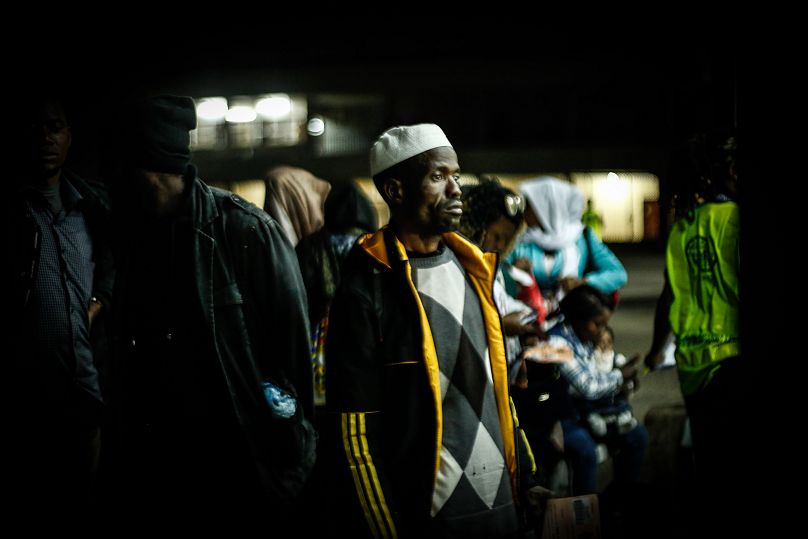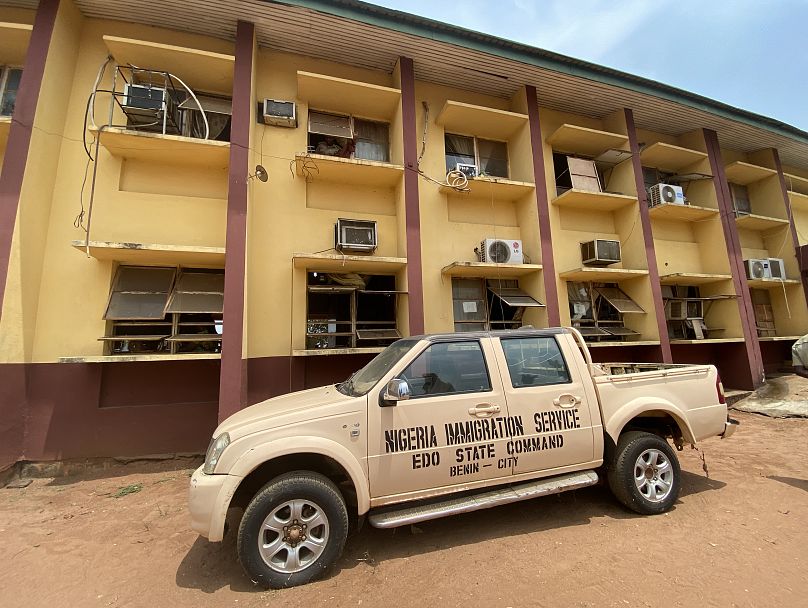Europe paid over 300 million euros to send people like Evelin back to their home nations. It forgot about her once she was there. As Euronews' repatriation investigation continues, we hear another horrific story from those who took part in the scheme.
No friends or family were waiting at Lagos airport’s cargo terminal when the flight touched down from Libya on a humid February night.
After descending the airplane's steps, one of the passengers - visibly moved - knelt on the tarmac and kissed the ground before making the sign of the cross.
It was clear that for some of the 160 migrants on board the flight, reaching home was a blessing - but it was a mixed one. Life in Libya had been brutal and dangerous, and the migrants coming home had spent months or more often years in prisons and detention centres. But for many of the returnees, life in Nigeria wasn't much better.
The flight from Libya to Lagos was just one of hundreds operated under the EU-IOM Joint Initiative, which has assisted the voluntary return of 81,000 African migrants - 50,000 of them from Libya. Under the programme, African migrants are offered flights back to their home country as well as cash, counselling and reintegration support.
But a Euronews investigation has uncovered massive failings in the programme, funded by the European Union to the tune of €357 million. The International Organisation of Migration (IOM) itself admits that only one-third of migrants who start the reintegration process actually complete the process. Others suggest the numbers are even lower.
Across seven African nations, Euronews has gathered first-hand accounts from migrants that have returned home on commercial or charter flights paid for by the EU. Most received no support from the IOM once they returned, and even those that did found it insufficient. In some cases, migrants were planning to leave home for the shores of Europe again.
Nigerian women are the most trafficked in the world, according to the IOM, which estimates that as many as 80% of girls and women arriving in Europe from Nigeria by sea were likely victims of trafficking for sexual exploitation, in Italy or other European Union countries.
The IOM has also documented an increase in sexual abuse of women and girls in Libya, and a corresponding increase in the number of women and girls who arrived on the shores of Europe pregnant, having been raped during their time in Libya.
Waiting for the flight that night in February were officers of Nigeria’s National Agency for the Prohibition of Trafficking in Persons (NAPTIP), who questioned every woman disembarking on who had sponsored their journey from Nigeria to Libya.
Formed in 2003, NATIP’s received 938 cases of alleged trafficking for investigation in 2019, completed 192 investigations, prosecuted at least 64 people and convicted only 43 traffickers. State officials have been accused of taking bribes from arrested traffickers.
But having escaped violence and sexual abuse in Libya, many women arriving home fell back into the cycle of exploitation in Nigeria - others said they received little support once they got home.
One women, Evelin, told Euronews she was forced into prostitution in Libya, became pregnant and then had a miscarriage. In Nigeria she was offered no health check either for the miscarried pregnancy nor for potential infections.
Another woman who was brought back to Nigeria in October 2019 told Euronews that she had been forced into prostitution in Benin City, Edo State.
Here, it is hard not to find a person who doesn’t have a family member in Europe. Many hundreds of young Edo girls have been trafficked to Europe via Libya and Asia yearly and Edo State is an internationally recognised sex-trafficking hub.
In August 2017, a state-led task force against human trafficking was established in Benin City, and in January 2020, NAPTIP opened an office funded by the UK government.
The IOM, in partnership with NAPTIP and other local organisations, provides access to special reintegration programmes for trafficked women, which includes housing, training, financial and medical assistance.
It offers a four-day workshop to all returned migrants, including victims of trafficking. The workshop includes business and management training, plus a specific focus on the psychosocial aspect of the reintegration process.
The NAPTIP also holds returned victims in “closed” shelters, to investigate cases and try to convince victims to testify in court against their traffickers. A parallel system of open shelters managed by local NGOs also exists to host victims who don’t want to go back to their families.
But according to the US State Department's annual Trafficking in Persons (TIP) report, the influx of migrants returned from Libya, some of whom were trafficking victims, has overwhelmed the shelter and service system, including NAPTIP facilities, and not all trafficking victims received care.
Many women and girls said they struggled with depression, anxiety, insomnia, flashbacks and other physical ailments that have sometimes limited their ability to work effectively, Human Rights Watch (HRW) said in a recent report.
Life is not easy for those women who had survived sexual and labour exploitation in Libya and are now back home in Nigeria, said Evon Benson-Idahosa, founder of Pathfinders Justice Initiative an NGO in Benin City.
“They will tell you they don’t have any option here. It’s a toxic environment where women think that prostitution is an alternative to poverty,” she said.
A 2019 official policy note by the UK government on the trafficking of Nigerian women controversially claimed that “becoming rich through illicit activities such as prostitution has become socially acceptable in Edo State”.
One NGO worker told Euronews that it is difficult to keep returning women and girls away from the networks that trafficked them in the first place. “Our girls tried their best to return to their families, yet many return to prostitution, others are still in contact with their traffickers,” he said.
And in Edo State, the conviction rates are pitiful.
As of 2020, only 33 trafficking cases are under investigation, while only 14 cases have been brought to court. No verdict has been signed yet, and nobody has been convicted.
An investigator working with the Edo Task Force in Benin City told Euronews that the justice system was “slow and corrupt, generally.”
“Sometimes the trafficker is a family member, or they can even offer money to the victim, so that they will refuse to attend court as a witness,” she said.
A senior NAPTIP official, meanwhile, said that while a “victims’ story or evidence is key to successful conviction in view of our judicial system and we do our best to encourage them to come over to give their testimony, we can't force them.”
An officer working with the Nigerian Immigration Service, who investigates returned victims of trafficking through their Facebook accounts, told Euronews that despite the multiple efforts to stop the trafficking, many women are re-trafficked or leave again after only a few months. In 2018, NAPTIP intercepted 134 previous victims of trafficking who had been re-trafficked again outside the country.
But even those who have suffered in Libya have not given up the hope to try and reach Europe again.
“I will not go to Libya again, it’s too dangerous,” a women in Benin City told Euronews after her return, “but I will try another way. I want to go to Europe.”













